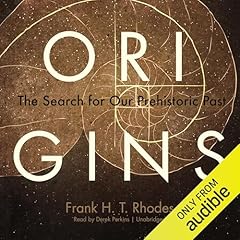
The Cro-Magnon: The History and Legacy of Europe’s Early Modern Humans
No se pudo agregar al carrito
Add to Cart failed.
Error al Agregar a Lista de Deseos.
Error al eliminar de la lista de deseos.
Error al añadir a tu biblioteca
Error al seguir el podcast
Error al dejar de seguir el podcast
 Exclusivo para miembros Prime: ¿Nuevo en Audible? Obtén 2 audiolibros gratis con tu prueba.
Exclusivo para miembros Prime: ¿Nuevo en Audible? Obtén 2 audiolibros gratis con tu prueba.Compra ahora por $9.76
-
Narrado por:
-
Colin Fluxman
In March 1868, in a rock shelter in southwestern France, railroad workers came across relatively modern looking human skulls, flint tools, and animal bones. To investigate the limestone cliff shelter, the French geologist Louis Lartet was brought in to perform excavations, during which he uncovered four partial skeletons and ornaments of shell, ivory and reindeer antler. Given the ancient nature of the remains, the specimen types were named after the Abri de Crô-Magnon (abri = rock shelter, an dcrô= hole) they were discovered in.
Notable finds from the rock shelter were the Cro-Magnon 1, a nearly complete male skull (missing only his teeth) with remains of his skeleton, Cro-Magnon 2, partial remains of a female cranium, and Cro-Magnon 3, the partial remains of a male cranium. Based on the remains, the site likely dates to the Upper Pleistocene Era between 32,000 and 30,000 years ago. Of the three skulls that were uncovered, Cro-Magnon 1 was considered the type specimen for the Western European “race” (an artificial construct of the time it was discovered), even though the skull featured more gracile features than the other two skulls and was not that similar to them either.
The Cro-Magnon were Homo sapiens, and the most defining characteristics of the species are the cultural traits that begin to show in the archaeological record. Tools were beginning to be made from multiple materials, and these people would often travel long distances or trade to acquire specific materials for tools. Symbolic material became increasingly common among them, as cave paintings, figurines, shell beads, pendants, and even early burials were more common with modern humans than Neanderthals, and this abstract way of thinking may have helped the species be more successful in adapting than the other contemporary humans.
While in the 21st century, scientists may refer to the Cro-Magnon as European Early Modern Humans, this was not case when the Cro-Magnon remains were first uncovered. In 19th-century Europe, there was a nationalist debate as to where the “first” Europeans emerged, and the mixing of nationalistic concepts and cultural hierarchy that was prevalent in Europe at this time made the scientific understanding of the Cro-Magnon within human evolution slow to progress. It is therefore necessary to look at the Cro-Magnon’s biological history and the European cultural history to analyze how the remains of Cro-Magnon have been viewed and used over the past few centuries.
The Cro-Magnon: The History and Legacy of Europe’s Early Modern Humans looks at how these early Homo sapiens reached Europe, their interactions with the Neanderthals, and more.
©2018 Charles River Editors (P)2018 Charles River EditorsLos oyentes también disfrutaron:




















Structure and content: Well organized, informative content. Interesting information efficiently conveyed.
Recommended.
Excellent overview of cro-magnon people
Se ha producido un error. Vuelve a intentarlo dentro de unos minutos.


